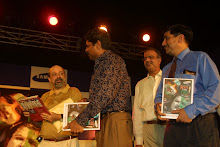Show Me the Money
By Gulu Ezekiel
The face of world cricket is set to change with England all-rounder Andrew ‘Freddie’ Flintoff carving out his little bit of history by declaring himself as the game’s first freelancer.
This is not an entirely unforeseen development following the launch of the Indian Premier League in 2008 and other Twenty20 leagues also cropping up around the world. But few could have anticipated it happening quite so soon.
For sure there are going to be plenty of twists and turns while this latest chapter in international cricket unfolds with Flintoff still battling to be match fit.
It is also still unclear how his own board, the England and Wales Cricket Board (ECB) and the IPL committee will react to the announcement by Flintoff’s agent that he intends to travel the cricket world, making appearances for franchises as far-flung as India (where he is already signed up with the Chennai Super Kings), Australia, South Africa and perhaps even the West Indies.
IPL czar Lalit Modi has stated a player cannot appear for his franchise unless he gets an NOC from his parent body. But it has become clear that the IPL rules and regulations are written in a kind of magic ink that tends to disappear once the franchise owners make their demands. We have seen that during the split between sections of the BCCI and the International Management Group which helped organize the first two IPL seasons. It has become a case of the tale wagging the dog.
There is also the nagging question of restraint of trade. Can a national body like the ECB come in the way of a cricketer who does not sign their contract (as in Flintoff’s case) and instead sells his wares to the highest bidder? At best they can decide not to include him in the national side.
Flintoff can earn tons more money plying his trade around the world playing the Twenty20 game (aka ‘cricket-lite’) than appearing again in England colours having already retired from Test cricket. So the choice appears to be a no-brainer for both the agent and the player in question.
Since players’ agents work on a commission basis, it is obvious they will encourage their star clients to go for lucrative deals rather than opt for national duty. Or as Tom Cruise put it so succinctly in the movie Jerry Maguire: “Show me the money.”
Flintoff’s case will be avidly followed by professional cricketers around the world particularly the likes of Chris Gayle (West Indies), Kevin Pietersen (England) and Brendon McCullum (New Zealand) all of whom have already had to wrestle with the cash v. country conundrum. And really, who can blame them? The toothless International Cricket Council watches on helplessly even as the game is hijacked by fat-cat businessmen and agents out to milk the game and line their own pockets.
Aussie bad boy Andrew Symonds had indicated he would go the same way even before Flintoff. Symonds has been banished from the national team due to his drinking problems but his IPL franchise Deccan Chargers have expressed their support for him.
The crisis in West Indies cricket is an example of how the sudden influx of massive sums of money can undermine a national association. The West Indies Cricket Board has been forced to field a second-string team as it is unable to meet the fresh financial demands of its superstars who find the IPL riches too juicy to resist.
What is fascinating about cricket is that the more things change, the more they remain the same. How competitive cricket emerged in 18th century England gives some context to Flintoff’s case.
The first recorded match in which prize money was on offer (10 Pounds Sterling) dates back to 1700. Just 50 years later the first and most famous professional cricket club was formed at Hambledon, Hampshire (known as ‘the cradle of cricket’).
The early pros received lucrative challenges from clubs and villages around England and would ride horseback and later by train to earn their living. This was the dawn of the freelance pro.
Today horse and train have been replaced by the corporate jet.
But by the mid-19th century, betting mixed with alcohol led to widespread match-fixing and violence breaking out. The authorities plucked from elite establishments were forced to step in, clean up the game and establish the county championship where amateurs reigned.
South African captain Graeme Smith dubbed as ‘meaningless’ contests like the just-concluded England v Australia ODI series. But does Smith seriously feel Otago Volts v Wayamba or Cape Cobras v Sussex Sharks in next month’s inaugural IPL Champions League have any meaning to them?
What happened 150 years ago should come as a warning to those who wish to ride the Twenty20 gravy train. The shortest form of cricket is also the most susceptible to betting and fixing. But then history has a nasty habit of repeating itself especially for those who either willfully ignore it or are just plain ignorant. Watch this space!
(Published in New Indian Express, Hindustan Times and dreamcricket.com; Sept’09)

No comments:
Post a Comment